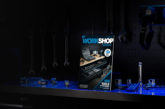Engine parts manufacturer, Bosch, claims it has achieved a breakthrough in diesel technology by dramatically cutting NOx emissions.
It says that in RDE (real driving emissions) testing, emissions from vehicles equipped with its new diesel technology are not only significantly below current limits, but also those scheduled to come into force from 2020.
Since 2017, European legislation has required that new passenger car models tested, according to an RDE-compliant mix of urban, extra-urban, and motorway cycles, emit no more than 168 milligrams of NOx per kilometre. As of 2020, this limit will be cut to 120mg.
Bosch claims that, in tests, vehicles equipped with its diesel technology achieved as little as 13mg of NOx in standard legally-compliant RDE cycles. That is approximately one-tenth of the EU limit that will apply after 2020. And even when driving in particularly challenging urban conditions, where test parameters are well in excess of legal requirements, the average emissions of the Bosch test vehicles, it says, are as low as 40mg/km.
Talking at the company’s annual press conference in Germany, Bosch CEO, Dr Volkmar Denner said: “There’s a future for diesel.
“We want to put a stop, once and for all, to the debate about the demise of diesel technology.”
Bosch claims a combination of advanced fuel-injection technology, a newly developed air management system, and intelligent temperature management has made such low readings possible.
The reduction in NOx has been achieved by refining existing technologies, removing the need for new components, which won’t add to vehicle costs.
Denner said: “We firmly believe that the diesel engine will continue to play an important role in the options for future mobility.
“Until electromobility breaks through to the mass market, we will still need these highly efficient combustion engines.”
His ambitious target for Bosch engineers is the development of a new generation of diesel and petrol engines that produce no significant particulate or NOx emissions.










